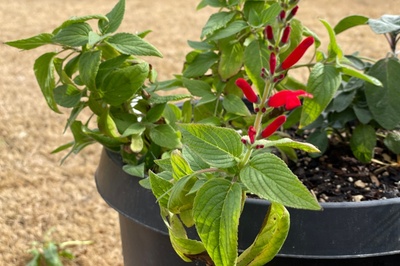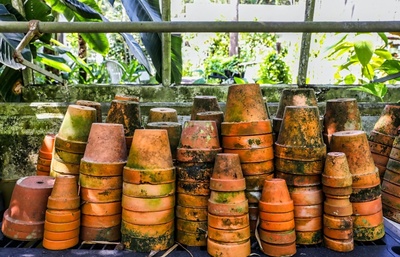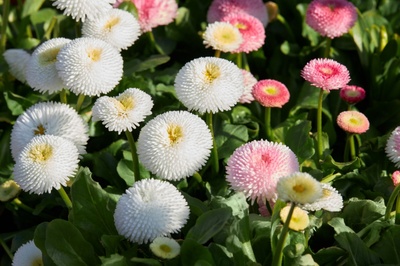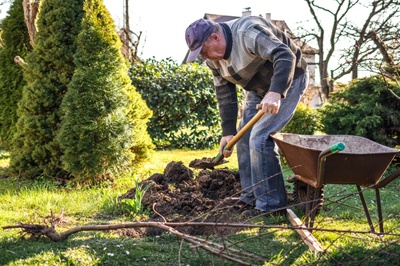Perlite vs Vermiculite: What's the difference & which to choose?
Have you ever looked at your potting soil closely?
If you have you may have noticed a white or off white granular material that's mixed into the soil. This is especially prominent when using compost to sow seeds, take cuttings or even re-pot a house plant.
These substances are Vermiculite & Perlite.
These two handy substances are a godsend to all gardeners. They can make compost drain better and also retain moisture, even though that sounds like a contradiction.
So lets dig into it, What is vermiculite? What is Perlite? What do they do? What's the difference? Which one should you choose?, here’s all you need to know...
What is Perlite?
Also known as "volcanic popcorn", Perlite is made of amorphous volcanic glass and is typically formed by the hydration of obsidian. It is a white granular material that is made by heating volcanic glass until it expands and ‘pops’, like popcorn. It is sterile, lightweight and has a neutral pH, so it’s very easy to work with.

Perlite for plants - When mixed with compost, it traps air pockets in the compost, which improves drainage. Perlite is often used in propagating cuttings, where free-draining compost is needed, or in sowing seeds.
Because it is porous, perlite soil absorbs water and can be used to improve moisture retention in compost, but its primary use is to improve drainage.
Shop Perlite Seed & Cutting Compost today.
How to use Perlite when planting:
Perlite is most often mixed with composts to improve drainage. Here are a few of the most common uses:
-
A 1:4 mix of perlite and compost makes a free-draining potting medium ideal for succulents.
-
Softwood and semi-ripe cuttings will root well in perlite. Part-fill, a plastic bag with moistened perlite, insert the cuttings and seal the bag. After several weeks, roots will start to form. Once the roots are well developed, the cuttings can be potted on.
Perlite is very dusty, so dampen it with water before using it to avoid inhaling the dust.
What is Vermiculite?
Vermiculite is produced by heating a naturally occurring mineral (magnesium aluminium iron silicate) so that it expands. Like Perlite it is also a naturally occurring mineral.

Horticultural vermiculite is used for planting looks like small golden-brown flakes. It can absorb up to four times its own weight in water and will also absorb some minerals that plants need, such as potassium, magnesium and calcium.
Vermiculite for plants - Its water retention means it's the best when it comes to water retention and is ideal for potting up plants that need moist compost. It is sold as medium or fine grade – medium grade is better used in cuttings composts and fine grades in seed sowing.
NB: Don’t get horticultural vermiculite (sold in garden centres) mixed up with the vermiculite insulation granules sold in hardware stores – they are not interchangeable!
How to use Vermiculite when planting:
Vermiculite is mainly used to improve moisture retention. Here are a few examples:
-
A 50/50 mix of compost and vermiculite is perfect for houseplants that need a lot of water, such as maidenhair fern.
-
30% medium-grade vermiculite added to compost makes a suitable medium for cuttings and potting on seedlings.
-
Scattering a light covering of vermiculite on compost after sowing seeds helps keep moisture in and reduces the risk of ‘damping off’ when seedlings are attacked by a fungus that causes them to collapse.
Shop Vermiculite Seed Sowing Compost today.
Difference Between Perlite & Vermiculite?
Perlite and Vermiculite are very, very similar. But there are a few key differences.
Vermiculite is better for water retention, that also means in that moisture it retains key nutrients for your plants and cuttings to soak up.
Perlite works better to help drainage, this means its also better for loosening heavy, compacted soil. So if you have clay soil perlite will be your best friend throughout the winter months.
Both work well for blending into potting mixes, are approved for organic gardening and neither decompose in soil, so once added you will forever reap the rewards.
Vermiculite and perlite are just two of the many valuable products you’ll find in our centre.
Visit us today for all your gardening needs!




